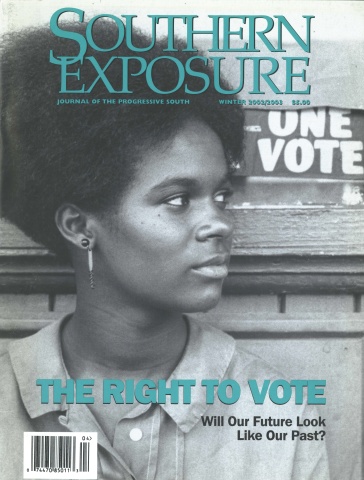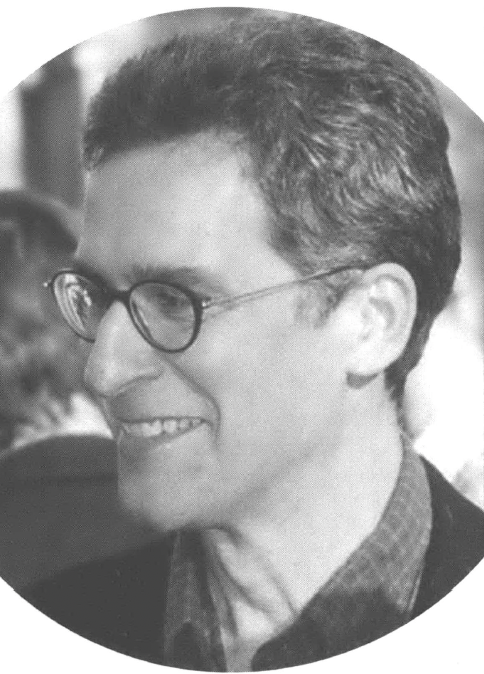
This article first appeared in Southern Exposure Vol. 30 No. 4, "The Right to Vote." Find more from that issue here.
On September 11, 2001, David Potorti’s eldest brother, Jim, was killed while working on the 95th floor of the World Trade Center’s North Tower. When David, a 46-year-old former television advertising producer in North Carolina, learned that a Chicago-based peace group called Voices in the Wilderness was sponsoring a peace walk from the Pentagon to the World Trade Center in late November 2001, he joined them. On the march he met Amber and Ryan Amundson, relatives of Craig Amundson, a 28-year-old Army multimedia specialist who was killed at the Pentagon, and Rita Lasar, a 70-year-old widow whose brother, Abe Zelamanowitz, died in the World Trade Center.
Out of their meeting came an organization called September Eleventh Families for Peaceful Tomorrows. Its core membership of 50 is limited to immediate and extended family members of those who lost their lives in the September 11 attacks. Its mission is “to seek effective nonviolent responses to terrorism, and identify a commonality with all people similarly affected by violence throughout the world. By conscientiously exploring peaceful options in our search for justice, we choose to spare additional innocent families the suffering that we have already experienced — as well as to break the endless cycle of violence and retaliation engendered by war.”
More than year after the 9/11 attacks and ten months after the birth of Peaceful Tomorrows, I sat down to talk with Potorti. In an office transformed from a one-car garage, with a large map of the United States to his left, a poster calling out for peace to his right, a constantly ringing phone, a large cat purring among us, and a baby sleeping in a room next door, he shared his thoughts about the peace movement, the media, and the use of 9/11 to justify war.
SE: Let’s start with your feelings about the way that 9/11 has been remembered.
Potorti: Lately, I have been really angry. I heard [Defense Secretary Donald] Rumsfeld talking yesterday and the way he linked [the plan to invade and occupy Iraq] to 9/11. As 9/11 demonstrated, he said, these people are just crazy, and they will come out of the blue and attack us and kill innocent Americans for no reason. Even though there is no link between Saddam Hussein and 9/11.
They are using the emotion of 9/11 for this new war. And it is clear — it is a patently planned, pre-programmed use of 9/11 for the next invasion.
SE: So what do you think people can do? Earlier, when you alluded to the relationship some are trying to create between Iraq and the crimes of 9/11, you said that people felt helpless. So what do you think we can do if we’re not helpless?
Potorti: Well, I think the biggest problem endangering us right now is not al-Qaeda, it is not Osama bin Laden. It is corporate control of the U.S. media. Because if we cannot get the truth out among the American people, then we’ve lost already. When I see Tom Brokaw or Peter Jennings or Dan Rather toeing the company line, repeating lies from Bush and Rumsfeld, then I feel really helpless, because they’re acting like a public relations firm for the government. Democracy can only exist when a well-informed public makes good decisions. And at the moment, I feel like we don’t have a working free press. We’re inside this bubble of propaganda, like we’re living in the Soviet Union or something.
There are two worlds — the internet world and the mainstream media world. I read commondreams.org, with brilliant essays from overseas — and then I look at our own newspapers moronic repeating of whatever the government line is. This is the only news that most people get in this country, so how can they possibly make an informed decision?
So we ought to start having actions at TV networks and doing some sort of protest action — to demand that they start telling us the truth.
SE: You and other members of September Eleventh Families for a Peaceful Tomorrow must have some interesting stories to tell about media coverage and media non-coverage.
Potorti: Oh, yes. I would say, most of our coverage is from the foreign press. We get a huge amount of interest from Britain, Germany, France, Holland, the Netherlands. Australia has been very interested. And [we’ve gotten] some local newspaper coverage, which is occasionally quite good.
We did this 9/11 [memorial] just last week in NY and we had a rally in Washington Square Park — about 3,000 to 5,000 [people]. We all came out, five of us holding hands. We had all lost our brothers and sisters in the World Trade Center, and one of us gave a speech. And I thought, this is a great picture, right? These five people directly affected, at this rally, with 3-5,000 people — and nobody covered it in New York. Zero coverage. Not the New York Times. Not the Daily News. Not the Post.
WUNC [the National Public Radio affiliate in Chapel Hill, N.C.], where I worked part-time for two years: absolutely no interest. They know I left their station to do this group. And they have never expressed the slightest interest in what I’m doing — as, first of all, a member of their listening audience; secondly, as a 9/11 victim. They’ve run NPR specials on 9/11. They interviewed a guy from Greensboro who has a piece of the World Trade Center. He’s an artist and he welded it into something, and I remember listening to The State of Things [a local NPR program], and she’s interviewing this guy and saying, “So tell us about your experience from 9/11.”
SE: What happened with the New York Times?
Potorti: We did this walk from the Pentagon to the World Trade Center sponsored by Voices in the Wilderness, and [we ended up in] Union Square Park on December 2, 2001. The New York Times had a photographer there, and he took a picture of all of us posing with our signs — “Stop killing the children of Afghanistan,” “Our grief is not a cry for war,” et cetera.
The picture appeared the next day in the Sunday “Portraits of Grief” page. They cropped out all the signs, and [the caption read], here is David Potorti and Amber Amundson vigiling at the park; they’ve both lost loved ones on September 11. No mention of what we were vigiling for, or that we had completed a peace march, or that we were against the war.
The Portraits of Grief book has come out, this hardcover book where they’ve reproduced all the photos of [victims] like my brother — and they’ve reproduced the picture of Amber and me. They’ve cropped it again, so now there is the sign that said, “Our grief is not a cry for war” — but the only thing you can see is “for war!” Amber and David — for war! Am I paranoid? Are they doing this on purpose or not?
SE: Have you had one experience this past year that strikes you as being most remarkable and memorable, in either a good way or a bad way?
Potorti: There was that woman at the San Diego radio station. It was a call-in show in December, 2001, and people were just rabidly pro-war — “Do you want to kiss Osama on the lips, what’s wrong with you?” The host was really pernicious — he appeared to be incredibly nice and listening, but he slowly turned on me, took everything I said and just shoved it down my throat. He did this five-minute monologue about how “on September 11 people kissed their wives and petted their dogs and sipped their coffee and a few moments later they were killed in a vicious attack.” Then he said, “Not one person has been killed in Afghanistan.” He dismissed the whole war in Afghanistan as “self-defense,” and said that therefore nobody really died. I was saying, “Excuse me, excuse me, what do you mean,” but they had turned my microphone off.
Then the show was over. His assistant was like, “Thank you very much for being here,” and I said, “Excuse me, I don’t get to respond to that bullshit diatribe that your host just went through?” And she just changed personalities, from typically sunny California to this horrible person. “We gave you an hour for your agenda.” I said, “Agenda?” And she said, with this vicious tone in her voice, “Yeah, I think you’re a peace activist from way back and your brother gets killed and you’ve got your moment in the spotlight and you’re riding it for all it’s worth.” This was a week before Christmas last year. I was speechless.
And the best moment? On July 5, Rita Lazar and I went to the Islamic Circle of North America convention. There were 10,000 people there. They had an interfaith dinner the day before. I talked about my experience, and afterward the head of the Muslim American Society approached me and said, “David, your brother is our brother, and we are all praying for his soul.” It brings tears to my eyes, because right outside the door there were 10,000 Muslims praying for my brother. That is, to this day, the nicest thing that anyone has ever said to me in terms of my work here.
SE: Do you feel that you change people’s minds with all the work you do?
Potorti: On some level I really do. You know, we get e-mails. There are people who say, “You have rekindled our faith in mankind.” Someone said, “You are our north star.” When you hear that, at least you know that you’re touching people. This one-on-one kind of thing is what keeps me going.
A few [e-mails] are very cruel. The people that send bad e-mails never put their name or their return e-mail address. It is like they just swoop in and drop the bomb and leave — sort of like our country. At least I have the power of my convictions. I’m doing this publicly with my own name. People know where to find me.
David Potorti and September Eleventh Families for a Peaceful Tomorrow can be contacted at www.peacefultomorrows.org.
Tags
Rania Masri
Rania Masri directs the Institute for Southern Studies’ Southern Peace Research and Education Center and codirects the Campaign to Stop the War Profiteers and End the Corporate Invasion of Iraq. (2003)

